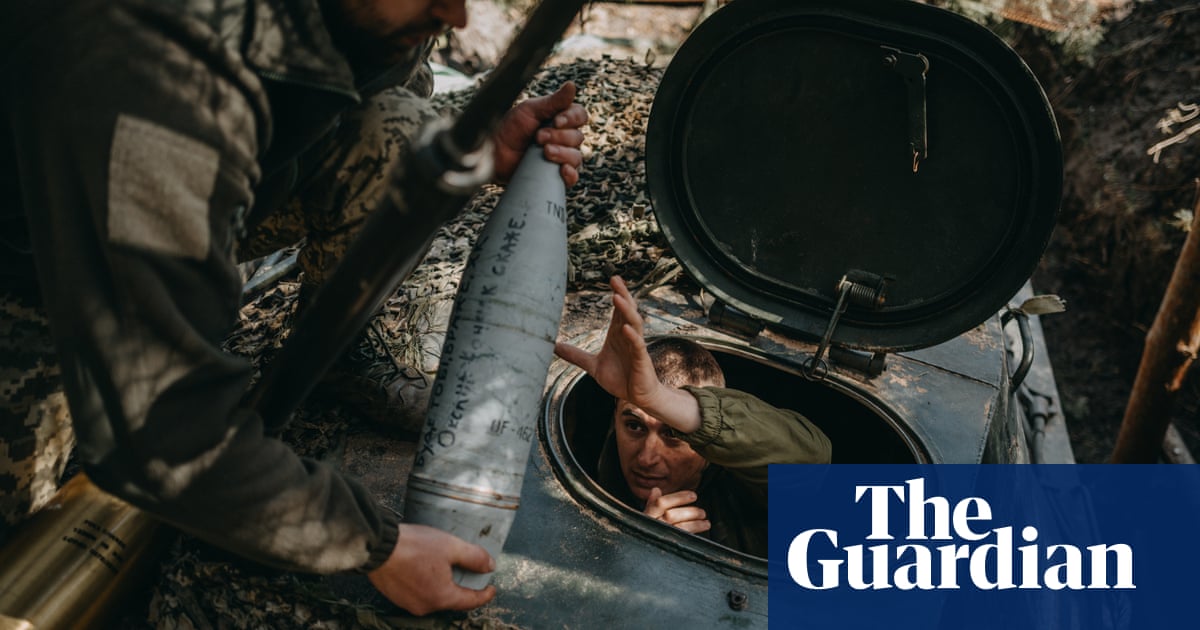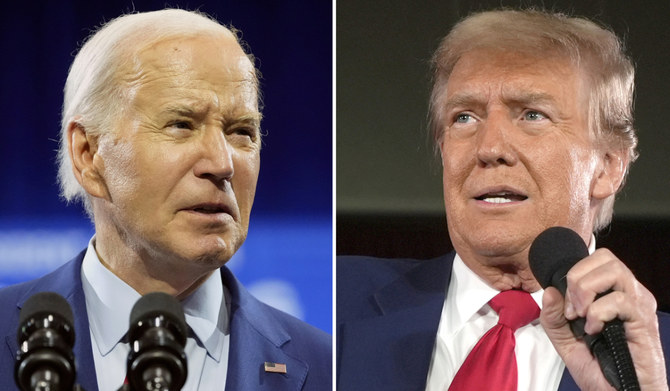
Ukraine and its Western allies say only a Russian withdrawal from occupied territories can form the basis for a settlement
While Biden has been generous with his support, Trump and running mate Vance want to prioritize domestic issues
LONDON: More than two years after Russia’s full-scale invasion of Ukraine, the possibility of another Donald Trump presidency has opened a window for Russian President Vladimir Putin to propose a settlement with Kyiv.
The official position of Ukraine, together with Western European countries and the US, is that only a Russian withdrawal from occupied Ukrainian territories can be the basis for any settlement.
Putin’s talk of negotiations comes amid growing doubts about the sustainability of Western support for Ukraine in a war many believe has reached a “stalemate.” The Russian leader perceives a weakening in Washington’s previously firm stance.
A source in Ukraine, speaking anonymously to Arab News, contested the idea of a “stalemate,” attributing the lack of progress to Ukrainian forces being inadequately equipped by their Western allies.
“A stalemate is something imposed by the rules of the game of chess, but that’s not what we have here,” the source said. “We have Ukraine being given pieces to fight this war by an alliance, and if we were given the pieces we needed, there would be no stalemate. The problem is that the alliance has not been supporting us with the objective of winning, but rather the objective of survival.”
Despite this perspective, military strategists argue that without Western support, Ukraine would likely have been forced to surrender to Russia months or years ago. Instead, Ukraine has managed to hinder Russian advances and achieve battlefield gains.
However, the steady flow of Western — particularly US — aid could soon diminish. While President Joe Biden has been generous with his support, Trump and his running mate, J.D. Vance, have cast doubt on that reliability.
At a campaign rally in Detroit in June, Trump described Ukrainian President Volodymyr Zelensky as “the greatest salesman of all time.”
“He just left four days ago with $60 billion, and he gets home, and he announces that he needs another $60 billion,” Trump said. “It never ends. I will have that settled prior to taking the White House as president-elect.”
Putin seems to have taken note, with US intelligence officials suggesting anonymously that Russia favors Trump as a candidate in the upcoming election.
“We have not observed a shift in Russia’s preferences for the presidential race from past elections, given the role the US is playing with regard to Ukraine and broader policy toward Russia,” a US intelligence official said.
In line with Trump’s inclination to make deals, Putin has recently emphasized his willingness to negotiate, proposing that Ukraine’s eastern regions of Donetsk, Kherson, Luhansk and Zaporizhzhia be ceded to Russia.
Although Russia only partially controls these regions, delays in US funding have given Russia a 3:1 advantage in equipment. This advantage has led to “tactically significant advances” by Russian forces, particularly in Kharkiv, challenging Zelensky’s firm stance against losing any territory in a deal.
INNUMBERS
• $211bn+ Cost of Russian military operations in Ukraine.
• 4.6M+ Ukrainians in need of humanitarian assistance.
• 60,000+ Combined death toll.
• 3.7 M+ Ukrainians internally displaced by the war.
Sources: Pentagon, IRC
Tatiana Stanovaya, a senior fellow at the Carnegie Russia Eurasia Center, wrote on X that she saw no near-term path to victory for Ukraine regardless of the US election’s outcome.
“It seems unlikely that the West will support Ukraine to a degree that could force Russia to retreat. From Moscow’s perspective, there are no actions that could decisively shift the situation in Ukraine’s favor,” Stanovaya said.
Mindful of the battlefield situation and the prospect of Trump returning to the White House, Zelensky has hinted at a willingness to negotiate. In late July, he invited Russian negotiators to a planned November peace summit, a move John Herbst, a former US ambassador to Ukraine, described as a nod to Trump’s desire to negotiate.
“It has to be a reasonable peace, which does not permit Russian occupiers to continue to torture, repress and murder the people of Ukraine who are being occupied,” Herbst told CNN.
Amid the renewed global efforts to find a negotiated settlement to the conflict, reports on Sunday said Indian Prime Minister Narendra Modi might visit Ukraine, coinciding with Ukraine’s National Day on Aug. 24. The visit is yet to be formally announced by the Indian and Ukrainian sides.
Last week, Dmytro Kuleba, Ukraine’s foreign minister, met with Chinese Foreign Minister Wang Yi in Guangzhou, in the first visit to the country by Ukraine’s most senior diplomat since Russia’s invasion of February 2022.
China has close ties with Russia and has pushed for an end to the war that would take into account the interests of both sides.
China did not participate in a peace conference in Switzerland last month that did not include Russia. It is not believed to be selling arms directly to Russia, but multiple reports say that so-called dual-use goods — which can have military or civilian uses — from China and other countries have ended up in Russian armaments.
Kuleba’s visit followed a public rebuke in June of China by Zelensky, who accused it of helping Russia block countries from participating in the Swiss peace conference.
Some suggest Zelensky’s talk of negotiation is mere politicking, aiming to align with a potential US president. Others argue it does not reflect the stance of Ukraine’s new military commander-in-chief.
Colonel General Oleksandr Syrskyi admitted to the UK’s Guardian newspaper that recent Russian gains had placed his army in a “very difficult” situation. However, he emphasized that these “tactical” victories were not the operational breakthroughs necessary to justify Russia’s significant losses.
Oubai Shahbandar, a former Middle East defense adviser at the Pentagon, described the daily loss of life experienced by the Russians as “unprecedented.” Nevertheless, he noted that Ukraine also struggles to replenish its manpower after nearly 30 months of fighting, with calls for half a million more soldiers and the barring of men aged 18 to 60 from leaving the country sparking a public backlash.
“By all definitions, the conflict is a stalemate, but Moscow is hoping that by using sheer mass it can overwhelm and exhaust the Ukrainians,” Shahbandar told Arab News.
He expressed skepticism about negotiations occurring before next year, citing the necessity of US participation, which is unlikely during Biden’s “lame duck” period.
Furthermore, he said Moscow lacked “any real incentives or pressure to negotiate a deal that would have a realistic chance, and Kyiv also requires incentives to agree to a deal.”
Contrary to some analysts, Shahbandar does not view a prospective Trump win as a victory for Russia. Instead, he sees it as a potential catalyst for both sides to negotiate a realistic conclusion to the war.
“Prevailing analysis among many think tankers and mainstream media outlets is assuming that a Trump electoral victory is good news for Russia and bad for Ukraine,” he said. “But the reality of a Trump presidential policy will be much more nuanced than he is being given credit for.”
This has led others to interpret Putin’s calls to negotiate as an attempt to capitalize on the uncertainty and make a deal now, rather than a sign of confidence in a Trump victory.
A source with ties to Russia told Arab News that while they did not see Putin acting with increased flexibility, they agreed he would likely try to leverage Trump’s electoral run. If that strategy fails, Putin may regret the rigidity with which he has waged this war.
Midway through its third year, amid growing anger over the government’s efforts to increase troop numbers, Ukrainians remain resolute in their desire to expel Russian forces. A recent poll indicated that only 32 percent of Ukrainians would accept ceding territory to end the conflict.












